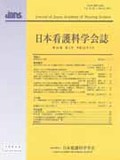Japanese
English
- 販売していません
- Abstract 文献概要
- 参考文献 Reference
要旨
目的:救急搬送された自傷患者に対する救急看護師の関わり方の実態と,このうち自傷患者への対応として推奨される関わりを多く実施している看護師の特徴を,明らかにすること.
方法:救急部門経験1年以上の看護師1,000名を対象に無記名自記式質問紙調査を実施し,262名(26.2%)の回答を分析した.
結果:救急看護師は自傷患者に対し救命と傾聴に努めているが,回避的な関わりも多くみられた.半数の看護師が自傷の理由をたずねており,3割が希死念慮を確認していた.自傷患者への対応として推奨される関わりの多さは,自傷者と接した経験,救急部門での自傷患者看護に関する研修経験,自傷患者看護のやりがい感,その際の不安の低さ,およびその際に同僚に自分の気持ちを表現できることと関連していた.
結論:自傷患者への対応として推奨される関わりを学ぶこと,自傷患者へ対応するための院内体制を整備すること,これらを通して不安を軽減し自傷患者への看護のやりがい感を高めることが,自傷患者への適切な関わりを促進する可能性がある.
Abstract
Aim: To describe the actual condition of care toward patients with deliberate self-harm(DSH) by emergency department nurses(EDN), and to reveal the correlates to the care recommended in previous literatures.
Methods: A self-administered questionnaire was distributed to 1,000 Japanese EDN with a year or longer of experience and 262(26.2%) responded.
Results: The EDN tried to save DSH and to listen to them carefully, although they often avoided contact with DSH. Half of the EDN inquired into the reasons for self-harm, and 30% confirmed the presence of suicidal thoughts. The amount of effort to increase help-seeking tendencies among the EDN was associated with the experiences in DSH care, the experience of training in DSH care in emergency departments, motivation towards DSH care, feeling less anxious about DSH, and the ability to disclose their own feelings to their coworkers in DSH care.
Conclusions: Learning skills previously recommended and improving the conditions of DSH care in hospitals will reduce anxiety with inducement to DSH care. In addition, it may also promote more appropriate care to DSH from EDN.
Copyright © 2013, Japan Academy of Nursing Science. All rights reserved.


